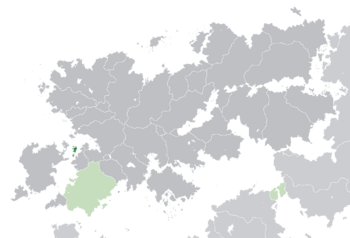Sasora
This article is incomplete because it is pending further input from participants, or it is a work-in-progress by one author. Please comment on this article's talk page to share your input, comments and questions. Note: To contribute to this article, you may need to seek help from the author(s) of this page. |
Sasora | |
|---|---|
 | |
| Status | Caesaerian province |
| Capital and largest settlement | Capulsus |
| Official languages | |
Recognized languages | |
| Demonym(s) | Sasoran |
| Government | Caesarian province |
• Emperor | Constantine XX |
| The Duke of Ostia | |
• Speaker of Assembly | Beladora Pelana |
| Legislature | Island Assembly |
| Establishment | |
• Latin conquest of Gelonia | 1632 |
• Current Imperial Charter | 1955 |
| Currency | Solidus ($) (LAS) |
| Time zone | UTC (±0 WBT) |
• Summer (DST) | UTC+1 (Latin Summer Time) |
| Date format | dd/mm/yyyy;(AD) |
| Driving side | left |
| Calling code | +4 |
| Internet TLD | .la |
Sasora, officially the Island of Sasora (Latin: Insula Sasorae; Lugense: Enez Lugenez; Sasoran: Isul Sasore) is a Caesarian province of Latium, located north of the Angusta Strait.
Sasora was first inhabited by the XXXX, a celtic tribe which later became part of the ancient Latin province of Gelonia in the late 2nd century BCE. The island became a territory of the first Kingdom of Gelonia in the 12th century, though was eventually surrendered to the Monarchy of Latium, after a brief spell under the dominion of Adrianople, in 1632. It has remained a Latin territory since, and was reorganized into a Caesarian province in 1950 following the Gelonian War of Independence.
The island is largely self-governing, with its own legislature, and legal and judicial systems. The Count Palatine is the personal representative of the Emperor, serving as the island's governor. Sasora is a party to the Belisarian Community through Latium. Centuries of Latin influence have developed into a unique Sasoran culture, though Latin is spoken in unison with Sasoran.
Etymology
The Gelonian name for the island is Lugenez. It is a combination of the Gelonian words "Enez", meaning island, and "lugenez" meaning fog or cloudy. This name is first attested in 2rd century BC writings. Since its discovery by Latins, the island has been referred to as Sasora. This roughly translates to "rocky coast" from the Latin from "saxosus" and "ora".
History
Antiquity
Middle ages
Modern history
Politics
{{main|Politics of Sasora|Monarchy of Sasora|Senate of Sasora|


